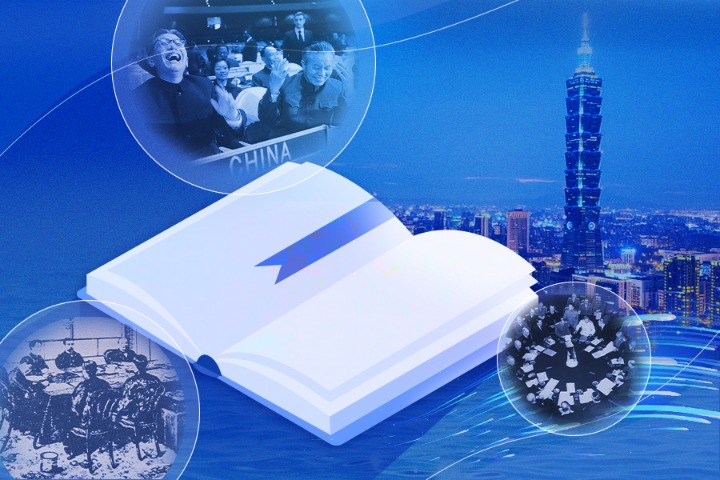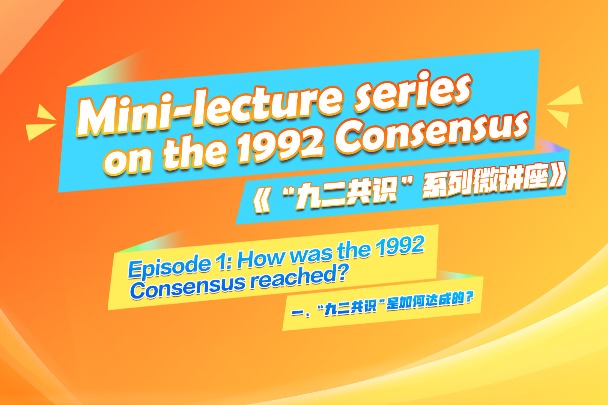Mainland visit breaks down preconceptions

Editor's Note: During his visit to the Chinese mainland between March 27 and April 7, many students accompanied former Kuomintang chairman Ma Ying-jeou. Let's hear what they have to say about what they experienced during the trip.
Lin Yen-liang: I see a different mainland on the 12-day visit
As a student of the Da Jeou Academy, I had the privilege to be a member of the delegation led by Ma Ying-jeou on his visit to the Chinese mainland. It was my third visit and also the longest stay. I only had a short stay in Fuzhou and Xiamen during the previous two visits. This time, I was fortunate to visit five mainland cities in the 12-day visit. The trip, though not a very long one, was quite an eye-opener for me.
First, I was amazed by the energy development on the mainland. Besides the economy, there is another thing most relevant to people's livelihood — energy. Before arriving at the Shanghai Pudong International Airport, I saw many wind power systems below from the plane. And on the way from the airport to Shanghai Hongqiao Railway Station, I saw a nuclear power plant. In Chongqing, I learned that the power output from the Three Gorges Dam hydropower project could supply several provinces with electricity. All this made me ponder that even the mainland, which is so vast and uses a fairly high percentage of new energy sources, does not stop using nuclear power. In contrast, Taiwan's nuclear power industry has remained stagnant in recent years, posing risks for the island's future energy supply.
The second thing that took me by surprise was the mainland's preservation of history. During the 12-day trip, we visited many historical sites of the War of the Chinese People's Resistance Against Japanese Aggression (1931-1945). Along came an endless stream of historical information. To be frank, the amount of information was so huge that it was hard to absorb in a short time.
But one thing is certain: it's not true that "many historical relics are nowhere to be found" on the mainland, which I heard as a child. At the anti-aggression war-related memorial sites, we felt the great dedication and sacrifice the pioneers and martyrs made for the Chinese nation at that time. The stone monuments displayed at the sites recorded the life story of the national heroes, and we could even leave messages to pay tribute to the martyrs.
Of course, with the mainland's vast land and abundant resources, the historical sites we saw during the trip were most likely only a small part of its historical legacy. Some historical buildings seem to be gone, but are actually relocated due to urban development reasons. But this is not the end. The relocated historical buildings will be blended into the local landscape through re-planning to create the right atmosphere for visitors. For instance, the Yellow Crane Tower in Wuhan, Hubei province, is one such example that impressed me.
Third, the integration of various ethnic groups and the development of Chinese culture also stood out. Both the bianzhong (set of chime bells) performance we appreciated in Wuhan and the repertoire played by the Shanghai Chinese Orchestra used traditional Chinese instruments.
One chapter of the orchestral performance in Shanghai also featured the accompaniment of multiple instruments of ethnic minorities, such as the dombra, a traditional Kazak instrument, and the morinkhuur, a traditional instrument of the Mongolian ethnic group. Some musical instruments were unheard of by me and I never thought traditional Chinese instruments can produce such majestic and powerful music. It reminded me of sayings like "all efforts aim for the highest ideals" and "all rivers run into sea". Adhering to these beliefs, China is able to unite people of all ethnic groups.
Fourth, I was also attracted by the mainland's promotion of smart technologies. As a doctoral student in electrical engineering, I'm particularly interested in the application of smart cities on the mainland, and the development of the mainland in this area is far beyond my imagination and knowledge. I did not expect to see the application of smart technologies in every aspect of urban governance on the mainland, from joint governance in metropolitan cities to service and livelihood management of neighborhoods.
These smart technologies are not something inaccessible for mainland people. Rather, ordinary people can have access to them in neighborhoods. I think this is related to the original intention of applying smart technologies to people's livelihood from the beginning, which is truly serving the people. In addition, I also saw many smart factories, where robots are involved in many links of the production process, from the initial manufacturing to the storage of components, from the assembly of components to the final delivery of finished products.
What I heard about the mainland formerly in Taiwan was that it's a place where people knew little about the world and many facilities were quite poor. After this in-depth visit, I found that the real situation was different from what I heard in Taiwan. This led me to think: how much of the information I hear about the mainland in everyday life does not correspond to reality?
In recent years, cross-Strait people-to-people exchanges have greatly reduced, consequently affecting understanding between young people from both sides of the Taiwan Strait. However, this exchange trip not only allowed young students from Taiwan to understand that the mainland is different from what we usually hear, but was also an opportunity for mainland youth to get to know their counterparts in Taiwan. With more communication, exchange and heart-to-heart conversation between young people across the Taiwan Strait, misunderstandings can be reduced and the bond of cross-Strait youth friendship can be strengthened.
The author is a doctoral student at the Department of Electrical Engineering of the University of Tainan. The views do not necessarily reflect those of China Daily.
Translated by Liu Ming
- Top News
- Events honor role of first provincial governor in modernizing Taiwan
- 'Soul Ferryman' of Taiwan Strait: Liu De-wen's 22-year mission to bring veterans home
- Taiwan-born kendo instructor grows cross-Strait ties
- Chinese mainland says cross-Strait consultation possible with recognition of '1992 Consensus'




